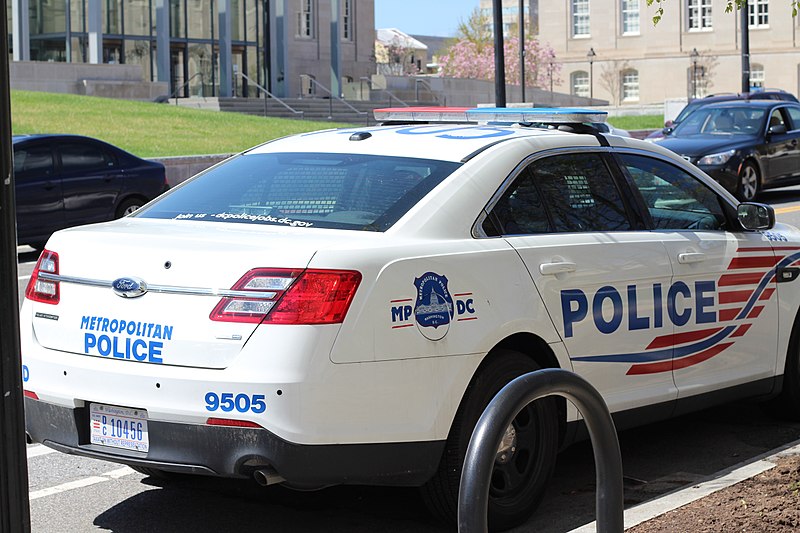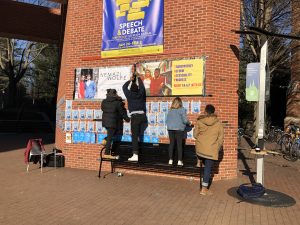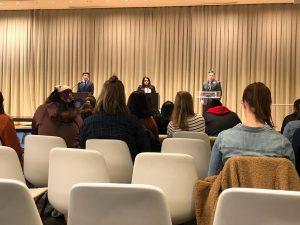A petition calling for Georgetown to end its contract with the Metropolitan Police Department (MPD) was posted on Change.org on June 2. The petition has over 6,000 signatures as of June 11, and has been supported by GUSA.
In response to the police killings of George Floyd, Breonna Taylor, and many other Black individuals, protests have erupted across the nation to call for systemic change in the way police interact with Black individuals. The petition suggests that the university responds to the concerns raised by such protests by ending its relationship with the MPD, citing the MPD’s “inhumane and violent” response to D.C. protestors as a major concern.
“As a Georgetown University community that stands for our Black community, and joins the fight against racism and hatred, it is imperative that the university, including the Georgetown University Law Center, cease all relationships with any police department,” the petition reads. “While we appreciate the University’s messages against racism and hatred, it is Georgetown University’s turn to take those words and put them into action.”
Other universities have made similar moves to end contracts with local police departments. The president of the University of Minnesota announced on May 27 that the university would no longer contract with the Minneapolis Police Department for university events, an action that was referenced in the Georgetown petition. That decision followed a letter written and posted on Twitter by University of Minnesota student body president Jael Kerandi on May 26 demanding that the university cease its partnership with the Minneapolis Police Department.
An organizer involved with the petition who is also a member of the Georgetown community and wishes to remain anonymous explained why they helped create the petition. “Although they sent letters out that they stood behind protestors and understood that George Floyd’s death was unjust, I wanted them to stand behind their words and stop the contract with the MPD. I saw how even on Georgetown Day, people of color felt unsafe and more wary on campus than when just GUPD was there,” they said
Kuma Okoro (SFS ‘20), former president of Georgetown’s Black Student Alliance, said his negative experiences with MPD and GUPD motivated him to support the petition. “In my time at Georgetown, I personally have had a lot of negative interactions with the police, and I also have friends who have been harassed and assaulted by the police,” he said.
“It’s great that Georgetown released a statement condemning institutional racism and all that, but I think that they have the power and the responsibility to create a safer campus for Black students, and I think that starts by ending their contract with MPD and making significant changes to GUPD.”
A June 3 update to the petition included a personal letter that was sent to members of Georgetown’s administration, including the office of President DeGioia, Georgetown Law Center Dean William M. Treanor, Georgetown Law Center’s Associate Vice President for Administration David Maro, the Office of Communications, Provost Robert Groves, and Vice President for Institutional Diversity and Equity Rosemary Kilkenny. The letter expands on the demands made by the petition.
“During my time at Georgetown, I was asked and questioned too many times by GUPD. I feared them, and this fear worsened at the sight of the Metropolitan Police Department,” the letter reads. “Although I am not a Black person, nor do my struggles compare to theirs, I still stand with them. The University should too.”
Other students have reported that MPD makes them feel unsafe on campus as well. In the petition’s “Reasons for signing” section, Jola Bankole commented “I don’t feel comfortable on campus with an organization that tear gassed a DC residents [sic] home.” Nick Rosas commented “I’ve personally been racially profiled by Metro PD around campus.”
Maggie McHale also left a comment saying that there are other ways that Georgetown should spend its money. “Put that multibillion dollar endowment to use: divest from institutions that promote white patriarchal supremacy in all its forms and support students and communities of color,” her comment reads.
In response to the petition, one student created an email template that automatically generates an email for students to send to members of Georgetown’s administration to demand that they end the relationship with MPD.
“Georgetown University cannot claim to atone for its participation in the sin of slavery if it fails to take tangible action towards dismantling systems of violence against its Black students. Terminating its contract with the police provides a place to start,” reads the body of the email template. “[Funds that go to the MPD] should be allocated for other resources… that actually support and benefit marginalized communities in Georgetown rather than traumatizing them.”
The petition has also sparked interest in the terms of the contract between MPD and the university. The GUPD website still states that it “enjoys a close professional relationship with the D.C. Metropolitan Police Department.” While the contract is not currently available to the public, some students, including GUSA Vice President Bryce Badger (MSB ‘21) have asked that it be declassified.
Other students have previously suggested changes to Georgetown’s relationship with police departments. In spring 2019, the student organization Georgetown United Against Police Aggression began to draft a list of demands for reforming GUPD and MPD. Floated ideas included the use of body cameras for all GUPD officers while on duty, the creation of a civilian oversight board, releasing GUPD’s protocol and procedures, and requiring that MPD officers be accompanied by GUPD officers while on campus.
Additionally, during their five-day occupation of Healy Hall starting on Feb. 24, the Black Survivors Coalition addressed the difficulties in reporting instances of bias and assault from GUPD officers. Members shared that they never received follow-ups on reports that they filed or that they were unable to file a report due to errors in the reporting forms.
In response to the concerns raised by the petition and ongoing protests, on June 5 Kilkenny, Gruber, and Vice President for Student Affairs Todd A. Olsen released a statement further explaining Georgetown’s relationship with MPD. “The use of late night MPD reimbursable detail is a required element of the university’s campus plan with the city of Washington, DC, but the reimbursable detail officers do not conduct patrols on the Georgetown campus or in university buildings,” it reads.
The statement also says that any MPD officers who provide security for Georgetown must undergo and complete training through the university. It promises that the university will change this training to ensure that elements related to implicit bias and de-escalation are included. No statement has been made indicating university support for cutting ties with MPD.
The anonymous organizer suggested Black students should be part of the conversation about changing policing on campus. “They should sit down with Black students and ask how they would feel more safe on campus and specifically ask them what type of security they want and from whom they want protection. MPD isn’t providing that.”
Okoro said that Georgetown’s support for Black students must go beyond just acknowledging the petition. “They need to invest in supporting Black students both academically and emotionally. They need to hire more Black trauma specialists, they need to improve the Title IX reporting system, they need to hire more Black faculty, and they need to put more Black faculty on the tenure track,” he said.
“It’s time to move past the statements and move past simply acknowledging racism. It’s time for them to acknowledge their institutional power and really work to correct those injustices.”






